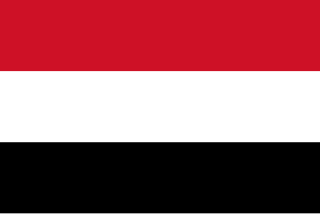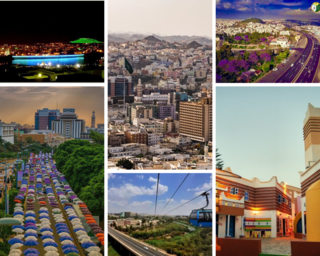Related Research Articles

Colonel Thomas Edward Lawrence,, a British archaeologist, army-officer, diplomat, and writer, became renowned for his role in the Arab Revolt (1916–1918) and the Sinai and Palestine Campaign (1915–1918) against the Ottoman Empire during the First World War. The breadth and variety of his activities and associations, and his ability to describe them vividly in writing, earned him international fame as Lawrence of Arabia, a title used for the 1962 film based on his wartime activities.

Riyadh is the capital of Saudi Arabia and the largest city on the Arabian Peninsula. Located in the center of the an-Nafud desert, on the eastern part of the Najd plateau, the city sits at an average of 600 metres (2,000 ft) above sea level, and receives more than 16 million tourists each year, making it the 2nd most visited city in the Arab world. Riyadh had a population of 7.6 million people in 2019, making it the most populous city in Saudi Arabia, 2nd most populous in the Arab world, and 38th most populous in Asia.

The Hejaz is a region in the west of Saudi Arabia. The name of the region is derived from the Arabic root Ḥ-J-Z, meaning "to separate," and it is so called as it separates the land of the Najd in the east from the land of Tihāmah in the west. It is also known as the "Western Province." It is bordered in the west by the Red Sea, in the north by Jordan, in the east by the Najd, and in the south by the 'Asir Region. Its largest city is Jeddah, the second largest city in Saudi Arabia, with Mecca and Medina being the fourth and fifth largest cities respectively in Saudi Arabia.

Faisal bin Abdulaziz Al Saud was King of Saudi Arabia and Custodian of the Two Holy Mosques from 2 November 1964 to 25 March 1975.

Fahd bin Abdulaziz Al Saud was King of Saudi Arabia and Custodian of the Two Holy Mosques from 13 June 1982 to his death. He was one of 45 sons of Saudi founder Ibn Saud and the fourth of his six sons who were kings.

Saudi Arabia, officially the Kingdom of Saudi Arabia, is a country in Western Asia constituting the bulk of the Arabian Peninsula. With a land area of approximately 2,150,000 km2 (830,000 sq mi), Saudi Arabia is geographically the largest sovereign state in Western Asia, the second-largest in the Arab world, the fifth-largest in Asia, and the 12th-largest in the world. Saudi Arabia is bordered by Jordan and Iraq to the north, Kuwait to the northeast, Qatar, Bahrain, and the United Arab Emirates to the east, Oman to the southeast and Yemen to the south; it is separated from the Sinai (Egypt) in the north-west by the Gulf of Aqaba. Saudi Arabia is the only country with both a Red Sea coast and a Persian Gulf coast, and most of its terrain consists of arid desert, lowland and mountains. As of October 2018, the Saudi economy was the largest in the Middle East and the 18th largest in the world. Saudi Arabia also has one of the world's youngest populations, with approximately 50 percent of its population of 34.2 million being under 25 years old.

Yemen, officially the Republic of Yemen, is a country at the southern end of the Arabian Peninsula in Western Asia. It is the second-largest Arab sovereign state in the peninsula, occupying 527,970 square kilometres. The coastline stretches for about 2,000 kilometres. It is bordered by Saudi Arabia to the north, the Red Sea to the west, the Gulf of Aden and Guardafui Channel to the south, and Oman to the east. Yemen's territory encompasses more than 200 islands, including the Socotra islands in the Guardafui Channel. Yemen is characterized as a failed state with high necessity of transformation. Yemen's constitutionally stated capital is the city of Sanaa, but the city has been under Houthi rebel control since February 2015 as well as Aden, which is also controlled by the Southern Transitional Council since 2018. Its executive administration resides in Riyadh, Saudi Arabia.

Khalid bin Abdulaziz Al Saud was the fourth King of Saudi Arabia from 25 March 1975 to 13 June 1982. He was one of the many sons of Ibn Saud, the founder of modern Saudi Arabia. King Khalid's reign saw both huge developments in the country due to increase in oil revenues and significant events in the Middle East.
A plot twist is a literary technique that introduces a radical change in the direction or expected outcome of the plot in a work of fiction. When it happens near the end of a story, it is known as a twist or surprise ending. It may change the audience's perception of the preceding events, or introduce a new conflict that places it in a different context. A plot twist may be foreshadowed, to prepare the audience to accept it. There are a variety of methods used to execute a plot twist, such as withholding information from the audience or misleading it with ambiguous or false information.

Salman bin Abdulaziz Al Saud has been the King of Saudi Arabia and Custodian of the Two Holy Mosques since 23 January 2015.

Abha is the capital of 'Asir Region in Saudi Arabia. It is situated 2,270 metres above sea level in the fertile Asir Mountains of south-western Saudi Arabia, near Asir National Park. Abha's mild climate makes it a popular tourist destination for Saudis.

The Order of the Nile was established in 1915 and was one of the Kingdom of Egypt's principal orders until the monarchy was abolished in 1953. It was then reconstituted as the Republic of Egypt's highest state honor.
Capital punishment is a legal penalty in Saudi Arabia. The country performed at least 158 executions in 2015, at least 154 in 2016, at least 146 in 2017, at least 149 in 2018, with possibly 184 executed in 2019.

Bahrain, officially the Kingdom of Bahrain, is a sovereign state in the Persian Gulf. The island nation comprises a small archipelago made up of 51 natural islands and an additional 33 artificial islands, centered around Bahrain Island which makes up around 83 percent of the country's landmass. The country is situated between the Qatari peninsula and the north eastern coast of Saudi Arabia to which it is connected by the 25-kilometre (16 mi) King Fahd Causeway. According to the 2010 census, Bahrain's population is over 1.2 million, of which around half are non-nationals. At 780 square kilometres (300 sq mi) in size, it is the third-smallest nation in Asia after the Maldives and Singapore. The capital and largest city is Manama.

The Order of King Abdulaziz is a Saudi-Arabian order of merit. The order was named after Abdulaziz Al Saud, founder of the modern Saudi state.
Islam is the country religion of Saudi Arabia. No law requires residents to be Muslim, however, public worship by adherents of religions other than Islam is forbidden. Any non-Muslim attempting to acquire Saudi Arabian nationality must convert to Islam. Furthermore, Salafism is official version of Sunni Islam and adherence to other strands even within Sunnism is restricted. Saudi Arabia has been criticized for its implementation of Islamic law and its human rights record. According to a 2012 online poll by WIN-Gallup International, 5% of 502 Saudi Arabians surveyed stated they were "convinced atheists".

The Hajj is an annual Islamic pilgrimage to Mecca, Saudi Arabia, the holiest city for Muslims. Hajj is a mandatory religious duty for Muslims that must be carried out at least once in their lifetime by all adult Muslims who are physically and financially capable of undertaking the journey, and can support their family during their absence.

The legal system of Saudi Arabia is based on Sharia, Islamic law derived from the Qur'an and the Sunnah of the Islamic prophet Muhammad. The sources of Sharia also include Islamic scholarly consensus developed after Muhammad's death. Its interpretation by judges in Saudi Arabia is influenced by the medieval texts of the literalist Hanbali school of Islamic jurisprudence. Uniquely in the Muslim world, Sharia has been adopted by Saudi Arabia in an uncodified form. This, and the lack of judicial precedent, has resulted in considerable uncertainty in the scope and content of the country's laws. The government therefore announced its intention to codify Sharia in 2010, and, in 2018, a sourcebook of legal principles and precedents was published by the Saudi government. Sharia has also been supplemented by regulations issued by royal decree covering modern issues such as intellectual property and corporate law. Nevertheless, Sharia remains the primary source of law, especially in areas such as criminal, family, commercial and contract law, and the Qur'an and the Sunnah are declared to be the country's constitution. In the areas of land and energy law the extensive proprietorial rights of the Saudi state constitute a significant feature.

The King of Saudi Arabia is the monarchial head of state and head of government of Saudi Arabia who holds absolute power. He is the head of the Saudi Arabian royal family, the House of Saud. The king is called the "Custodian of the Two Holy Mosques", a title that signifies Saudi Arabia's jurisdiction over the mosques of Masjid al Haram in Mecca and Al-Masjid an-Nabawi in Medina, the title has been used many times through the history of Islam. The first Saudi monarch to use the title was King Faisal, however, King Khaled did not use the title after him. In 1986, King Fahd replaced "His Majesty" with the title of Custodian of the Two Holy Mosques, and it has been ever since used by both King Abdullah and King Salman bin Abdulaziz.

Masjid al-Haram, also known as the Great Mosque of Mecca, is a mosque that surrounds the Kaaba in Mecca, in the Makkah Province of Saudi Arabia. It is a site of pilgrimage in the Hajj, which every Muslim must do at least once in their lives if able, and is also the main phase for the ʿUmrah, the lesser pilgrimage that can be undertaken any time of the year. The rites of both pilgrimages include circumambulating the Kaaba within the mosque. The Great Mosque includes other important significant sites, including the Black Stone, the Zamzam Well, Maqam Ibrahim, and the hills of Safa and Marwa.
References
- Graham, Helga (1978). Arabian time machine: self-portrait of an oil state. Heinemann. p. 35. ISBN 9780434303502 . Retrieved 26 August 2012.
- Colyer Ross, Heather (1981). The Art of Arabian Costume: A Saudi Arabian Profile (3rd ed.). Taylor & Francis. p. 68. ISBN 090751300X . Retrieved 26 August 2012.
| This Indian history-related article is a stub. You can help Wikipedia by expanding it. |